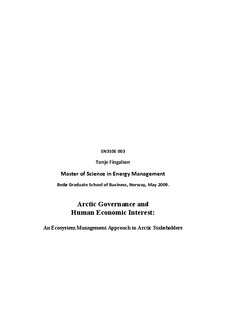Arctic governance and human economic interest : an ecosystem management approach to arctic stakeholders
Master thesis
Permanent lenke
http://hdl.handle.net/11250/140887Utgivelsesdato
2009Metadata
Vis full innførselSamlinger
Sammendrag
The Arctic has substantial natural resources and a rich wildlife which is important to the
inhabitants. Environmental changes and economic openings such as mineral extraction and
shipping have great consequences and opportunities for the global community. The dialogue
about how to govern the Arctic suggests this should be done with an ecosystem
management approach. This paper sheds light regarding how stakeholders in the Arctic
perceive ecosystem management and get influenced of so-called ecosystem management
plans.
Empirical data on ecosystem management is tied together with real life experience of ten
stakeholders in the Arctic. The theoretical foundation consists of stakeholder theory, the
value sphere and communicative arena which are finally examined in relation to the
empirical findings.
Despite varying interpretations of the term, findings show that stakeholders in the Arctic
associate ecosystem management with these elements: nature, economic interest and
people. Many view ecosystem management as a holistic approach and precautions are taken
before the consequences and impact are known. Stakeholders represent different
perspectives, each focusing on different Arctic issues. Ecosystem management indicates
closer cooperation between different interests rather than independent approaches to
issues. Indeed, the interests are economic in nature whether the natural wildlife represents a
food source for indigenous people, petroleum for the world’s economies or beneficial
healthy and stable environment. Arctic issues are intertwined.
Beskrivelse
Mastergradsoppgave i Energy management - Høgskolen i Bodø, 2009
